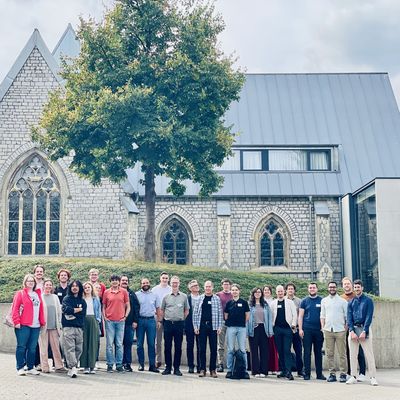Johannes Kruse successfully defended his dissertation
Congratulations to Johannes Kruse for the successful defense of his dissertation on "Machine learning of power grid frequency dynamics and control: prediction, explanation and stochastic modelling".

On January 27, Johannes successfully defended his dissertation at the University of Cologne. His research is about power grid frequency dynamics and control by using machine learning.
A reliable supply of electric power is not a matter of course. Power grids enable the transport of power from generators to consumers, but their stable operation constantly requires corrective measures and a careful supervision. In particular, power generation and demand have to be balanced at all times. A large power imbalance threatens the reliability of the power supply and can, in extreme cases, lead to a large-scale blackout. Therefore, the power imbalance is constantly corrected through distinct control schemes. The power grid frequency measures the balance of power generation and demand. To guarantee frequency stability, and thereby a balance of generation and demand, load-frequency control constantly counteracts large frequency deviations. However, the transition of the energy system to renewable energy sources challenges frequency stability and control. Wind and solar power do not provide intrinsic inertia, which leads to increasingly fast frequency dynamics. Different economic sectors become strongly coupled to the power system, as, for example, the adoption of electric vehicles will interconnect the transport sector and the power system. Finally, wind and solar power are weather-dependent, which increases the variability of power generation. All in all, this gives rise to diverse, interdependent and stochastic impact factors, that drive the balance of power demand and generation, and thus the grid frequency. How can we predict, explain and model frequency dynamics given its strong non-autonomous and stochastic character? In his thesis, Johannes uses machine learning to disentangle the effects of external drivers on grid frequency dynamics and control. First, he proposes a prediction model that only uses historic frequency data, but fails in representing external impacts. Therefore, he includes time series of techno-economic drivers and model their impact on grid frequency data using explainable machine learning methods. These methods reveal the dependencies between external drivers and frequency deviations, such as the important impact of forecast errors in the Scandinavian grid or the varying effects of different generation types. Finally, he integrates these drivers into a stochastic dynamical model of the grid frequency, which both represents short-term dynamics and long-term trends due to techno-economic impacts. His work complements traditional simulation-based approaches through validation and modelling inspiration. It offers flexible modelling and prediction tools for power system dynamics, which are profitable for systems with diverse impact factors but noisy and insufficient data.








